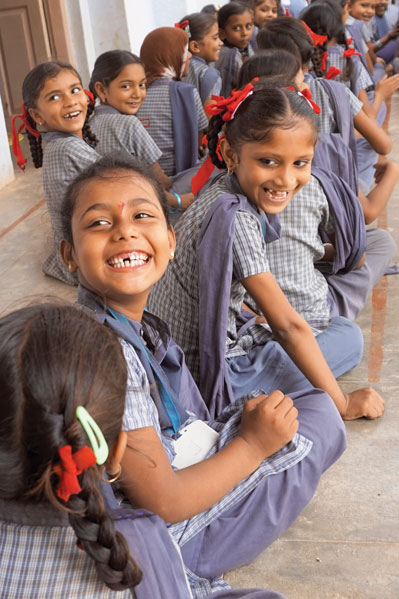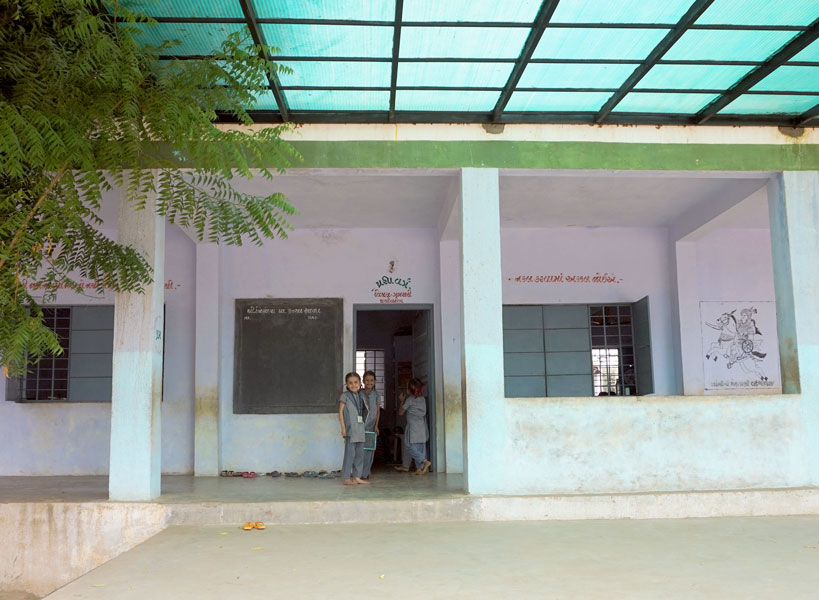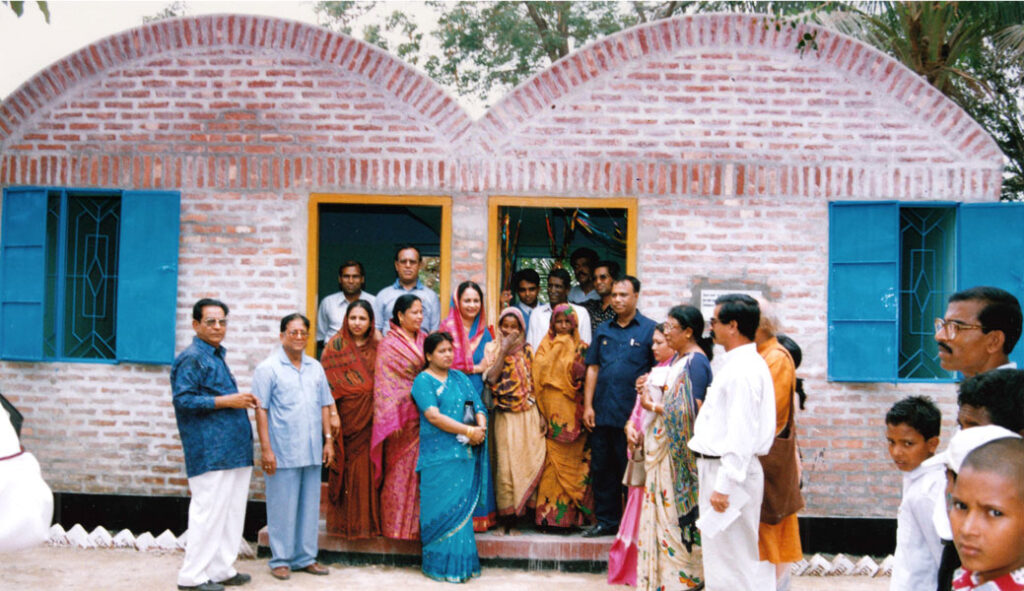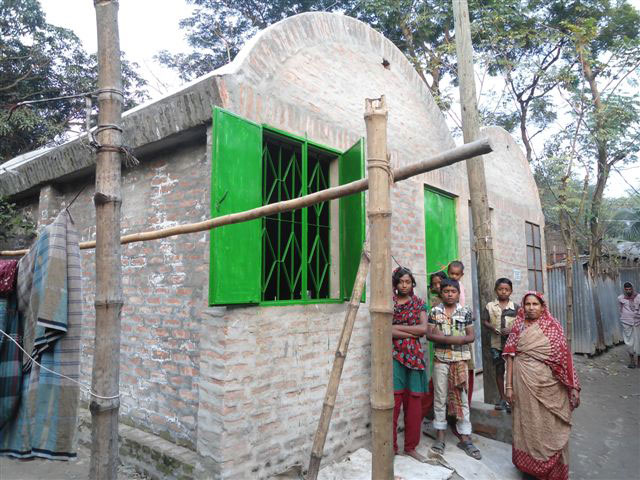Mending schools, Bringing smiles The latest TRF decision on a three-year pilot project making low-cost shelters and quality schools eligible for Global Grants, merits revisiting the phenomenal reconstruction work done by Rotary in Kutch after the devastating earthquake of 2001.
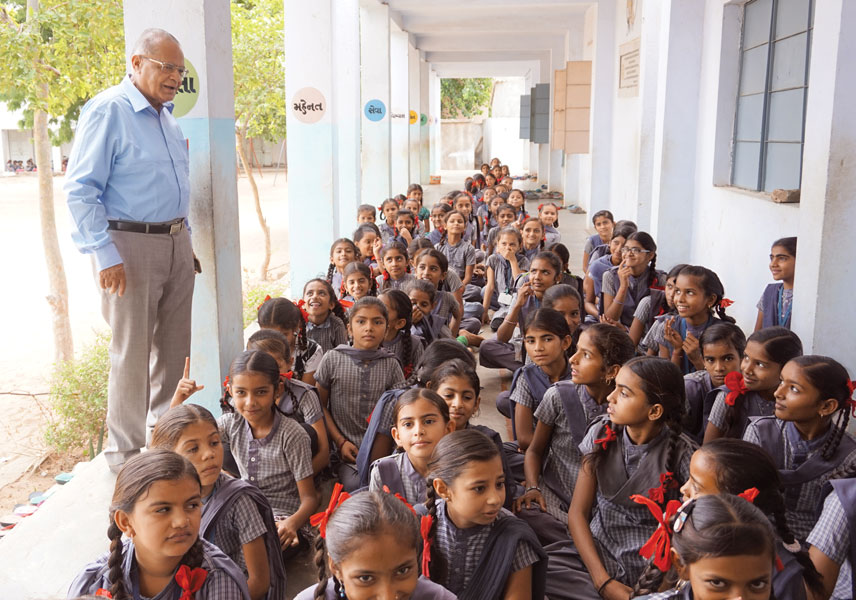
At Nirona village, about 45 km from the city of Bhuj, I walk into the Government Girls School that was badly damaged in the 2001 Gujarat earthquake and where Rotary has built ten classrooms. It’s a Saturday morning and I fear encountering an empty school. But a treat is awaiting me. A Bal Sabha is on and about 60 girls, smartly turned out in their grey-checked uniforms, are reciting bhajans and other devotional songs. One of them is playing on a dholak, and their recitations fill the air.
Kanchanben, the principal, says that over 400 girls, most from poor families, study in this school. Most girls say their fathers are farm labourers, but though their background might be humble, their dreams are not. Dimple has lost her father, but not hope of a promising future, and shyly spells out her dream to be a doctor. Bhanu wants to become a teacher, Priya wants to become a computer engineer.
At RI, there were serious doubts and misgivings about what Rotary was doing in Gujarat. With Rs 60,000 on each house, they said, you can only build a slum, but we proved them wrong.
– PDG Mohan Shah
The sky is overcast, but the rain gods play hide and seek with Bhuj and its surrounding villages. The banyan, neem, gulmohar trees in the campus keep it cool.
PDG Mohan Shah, D 3050, one of the main pillars of the massive rebuilding and rehabilitation work Rotary did in Kutch after the 2001 earthquake, building 1,000 homes and 781 schools in 181 villages, intervenes to say that in 2001, this was the only government school that was using a computer “so we gave them some computers”. Chimanbhai, a teacher presiding over the Bal Sabha, tells him one of them is not working and gets a promise of a new computer courtesy Rotary.
The classrooms are spacious and well kept; there are toilets with running water. Even in the other junior classrooms, some activity is on, and it is heartening to see Government teachers turning up on a Saturday. There are smiles aplenty, the girls are enjoying their music session.
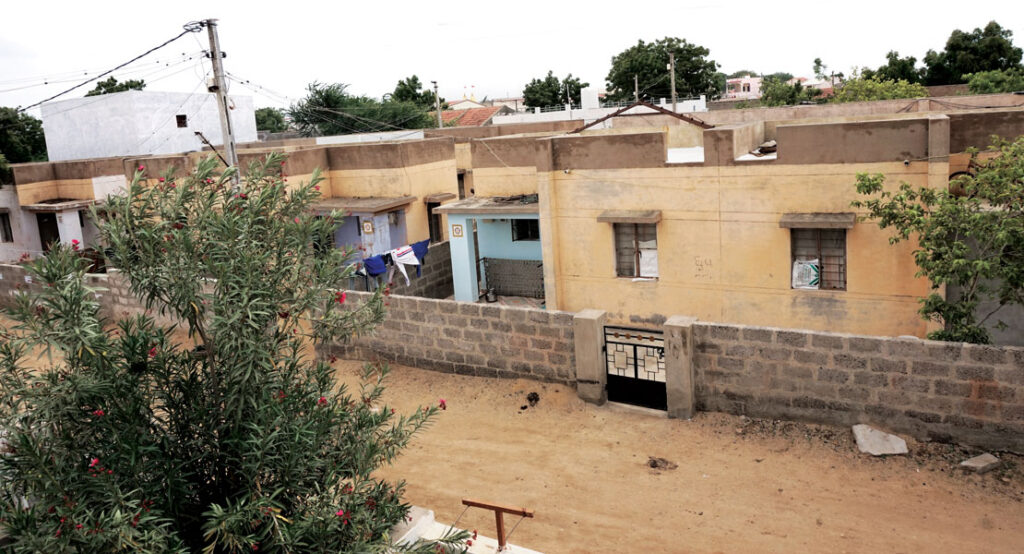
It’s a big campus; in India’s remote villages, land is not yet a luxury. Adjoining the “new classrooms” built by Rotary almost 10 years ago, is the dilapidated part of the original school that was damaged in the quake. “Nobody uses it”, says a teacher, adding “we only use the Rotary school!”
I leave the school smiling; the girls’ smiles are infectious.
A rewind
The mind goes back to that horrific day in January 2001, when tens of thousands of homes were reduced to rubble by Gujarat’s killer quake and lakhs of people left homeless. “You know what it takes to build just one house. Just imagine what it would take to build 1,000 homes and 781 schools in 181 villages. While the work was going on, PRIP Kalyan Banerjee made more than 50 visits,” recalls PDG Bharat Dholakia, who was the incoming District Governor of 3050 when the devastating earthquake hit Kutch on January 26, 2001.
While the rebuilding work was going on, PRIP Kalyan Banerjee made more than 50 visits.
– PDG Bharat Dholakia
“And he would do about 400 to 500 km car journey to see the reconstruction work. We would have organised some snacks or lunch, but he’d say let’s go to the venue… and we’d be on a cup of tea from the morning!”
Dholakia, who lives in Bhuj, was himself away at the District Conference at Mount Abu, and while returning “in one of the villages I drove past what I thought were bonfires lit to keep the villagers warm in the cold month of January.” But reality hit him hard when he realised that these were actually funeral pyres. As there wasn’t sufficient wood for individual cremation, bodies were piled on top of each other and set afire. These horrifying images would return to haunt him again and again.
Also, they were worried sick about their three children at Bhuj. “The house was 125 years old, we kept trying to get in touch with the children but all telephone lines were down. And somebody told us our locality was the worst affected!”
But though the house was about to fall, the children were safe. Within 11 days he was scheduled to leave for the International Assembly. “My son said how will you get the clothes out? I volunteered to step down. But soon Kalyanbhai came and he said you have to become DG and attend the assembly.” Banerjee organised an office for Dholakia in Mumbai.
From the about-to-collapse house, they somehow retrieved his clothes, he borrowed money from his relatives in Mumbai as all banks were closed and made it to the International Assembly.
The average administration cost of NGOs was 11 per cent, the highest being 32 per cent. Our cost was one per cent for rebuilding in Bhuj.
– PDG Mohan Shah
A VIP at the International Assembly
To his surprise, Dholakia found an escort for him at the Assembly; “I was interviewed by every possible media — Voice of America, the Canadian Broadcasting Corporation, and so on. Everywhere I was introduced as a “homeless Governor” and I’d say thank god you don’t call me hopeless governor!”
But the impact of a DG, who was personally affected by the debilitating quake, was great at the International Assembly. “The spouses of past RI Presidents wanted to give me a gift and I asked for a school in Bhuj. And for the first time a matching grant was given for construction work. The Japanese DG also raised a lot of money for the rebuilding in Kutch,” he says.
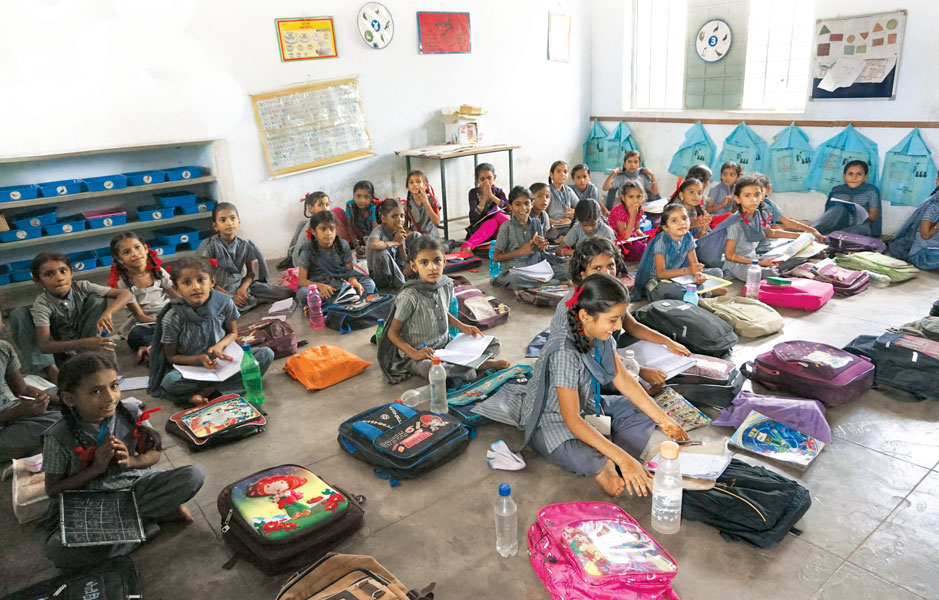
Bhuj District was badly affected by the earthquake and the reconstruction task was massive. Soon a Trust — Rotary Gujarat Earthquake Rebuild Trust (RGERT) under the chairmanship of PRIP Rajendra K Saboo was formed; Banerjee was its Managing Trustee and the other Trustees were past RI Directors Sudarshan Agarwal, O P Vaish, P C Thomas and Sushil Gupta, along with Dholakia, and PDGs Mohan Shah, Shashank Rathod and Prafull Bhatt.
Rotary Government partnership
The Trust entered into an agreement with the Gujarat Government “and we took seven talukas — there are about 100 villages in each taluka — to rebuild schools. Some schools needed two rooms, some three, or more. Each room cost about Rs 1.5 lakh, and the money came from TRF through three matching grants,” says PDG Mohan Shah, who was roped into the Trust and rebuilding work. As an erstwhile Congress legislator, he had excellent connections across political parties, particularly with Prime Minister Narendra Modi, who soon became Gujarat CM, even as the reconstruction work started and progressed.
You know what it takes to build just one house. Just imagine what it would take to build 1,000 homes and 781 schools in 181 villages.
– PDG Bharat Dholakia
But the task ahead was tough. The first challenge was safeguarding the building material; times were so bad that building material such as bricks, cement, steel etc, would disappear in the night. “We kept different contractors in each taluka… and I told my Congress workers that watching all this work and material is your responsibility. We had different contractors in different places, and built 1,000 houses in Kutch.”
He adds that incoming DG Bharat Dholakia played a big role in this work; “PRIPs Kalyan and Raja Saboo took him everywhere as a “homeless governor” and that got a lot of donations because people really empathised with his personal experience.”
Adds Dholakia, “We worked relentlessly; if Mohanbhai, went to the east, I’d go to the west. Once I accompanied PRID Sushil Gupta to a village. I was seeing it for the first time. I didn’t even know Kutch had such a village!”
An intriguing visitor
An interesting anecdote pertains to the visit of PDG David Fowler, an architect from London. “On his request, we took him to a house in a village, and as it is only a one room, kitchen, bath and toilet, Mohan (Shah) and I waited outside, also because we didn’t want to influence him in any way,” says Dholakia.
They were flummoxed when he didn’t come out for two hours and wondered what he was doing inside. Finally he came out and said he was taking pictures. “At dinner he presented us with a CD containing 200 photographs!”
Shah recalls how at RI, there were serious doubts and misgivings about what exactly Rotary was doing in Gujarat. “We spent only Rs 60,000 on each house and they said that with this kind of money, you can only build a slum, but we proved them wrong.”
He explains that Rotary was able to pull off this feat with this modest sum per house “because our administration cost was only one per cent. Around 168 NGOs worked here after the earthquake; we were one of the biggest. The average administration cost of the NGOs was 11 per cent, with one of them going up to 32 per cent.”
The Rotarians who worked hard for the rehabilitation and reconstruction of Bhuj travelled at their own cost, if overnight accommodation was required, it was at Shah’s house. “The difference was that many of us were personally affected and could understand better the pain and suffering that people experienced here,” he adds. Dholakia moved to his sister’s house in Mumbai, while his house had to be rebuilt.
So what was the response of the recipients, I ask Dholakia. “Oh, they were happy, but always wanted more. The schools we built wanted fans; such a demand was made when TRF Trustee Sushil Gupta was visiting one school. He immediately donated fans to that school. Next they said we want computers… the demands kept coming.”
“Rotary colony”
Shah adds that those who got homes started asking “for a watchman, saying thieves come here at night. This is a Rotary colony, so you have to give us a watchman! But we are happy that we built schools at places that were so much in the interior that no other NGO was willing to go there.”
At Padhar village, with a population of around 3,500 and about 17 km from Bhuj, we drive to one such “Rotary Colony”… there are a row of Rotary houses, modest but robust. In one of them we find Manoj Kumar and Rinku Devi, who have rented the house from the original owner. Manoj Kumar works in a private factory; they have two children and they find the house “comfortable”.
Most of the houses look similar, and all of them have the ‘Rotary’ logo on them. But one particular house stands out… it is freshly painted and looks spanking new. Rama, the owner, welcomes us into her home. Her husband Bharat, who runs a readymade garments business in Mumbai, bought this house a few years ago and “we’ve spent Rs 4 lakh to renovate it.” It has tiled flooring, and is well furnished. But more than anything else, Rama, who lives in the house with her two little sons, while Bharat is away in Mumbai, is very happy that “this is a safe locality”.
We go on to her terrace and Shah points out the Rotary logos on all the houses in the street.
As he looks back at the herculean effort the RGERT and local Rotarians made during Kutch’s rehabilitation, he says quietly, “Courage and confidence was the slogan of our District; I believe you have to be always ready to do what it takes. And we did it…”
Pictures by Rasheeda Bhagat
Bangladesh’s low-cost shelters
Bangladesh is a country that has been pounded by many disasters; affected by both droughts and floods. One of the worst cyclones the country saw was in 1991, in which 1,35,000 people were killed and thousands of homes were destroyed. Along with others Rotary has also built low cost shelters in Bangladesh. PDG M Jamaluddin, who is the Chairman, Rotary Shelter Bangladesh (1999–2016), says that in the Rotary year 1997–98 a total number of 530 low-cost shelters were built and handed over to beneficiaries under matching grants received by 53 different clubs of the country.
A total sum of $636,000 was received from TRF by these clubs under Matching Grants. Of the 530 shelters, a cluster with 142 shelters was built at Heather Kinross Rotary Shelter Village, benefitting 570 homeless people.
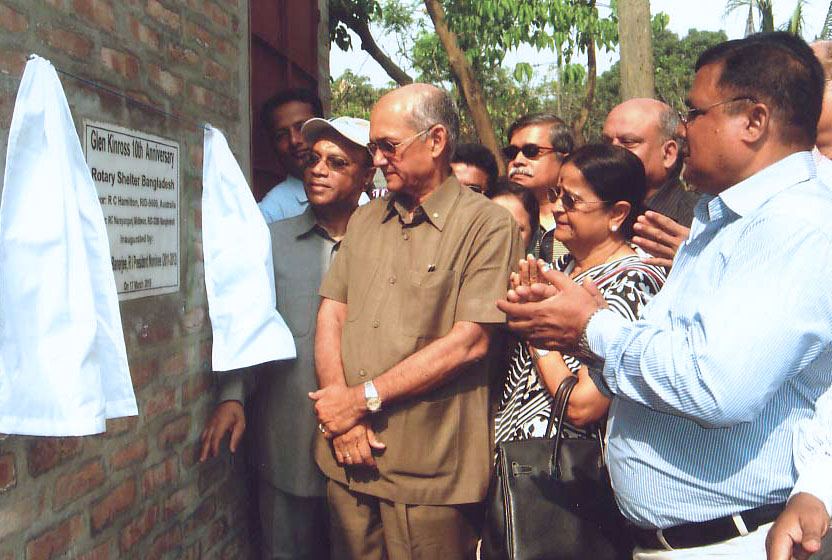
Apart from the Matching Grants, in 2008, RC Hamilton and other Rotary Clubs of District 9600, Australia, also came forward to support the battered people of Bangladesh. From their contribution of $165,004, 83 shelters were built at Heather Kinross Rotary Shelter Village. “This project, initiated to honour and celebrate PRIP Glen Kinross’s 10 years of service after his presidential year (1997–98) was titled ‘Glen Kinross 10th Anniversary Rotary Shelter Bangladesh’. These shelters were built under the direct supervision of RC Narayanganj Midtown, D 3281, Bangladesh,” said PDG Jamaluddin.
RB
Low-cost shelters back in global grants
At their September 2016 meeting, TRF Trustees approved the inclusion of low cost shelters and simple schools in global grants. Beginning January 1, 2017, as a three-year pilot project, construction of low-cost shelters and simple schools will be permitted in global grants. The RI general secretary is developing guidelines for these projects and detailed guidelines will be released before 1 January 2017 as part of a general communication campaign to alert clubs and districts about the eligibility of low cost shelters and schools.
But a TRF communication clarifies that “construction of these items, by themselves, are not eligible for global grant funding. Any of these projects approved after 1 January 2017 must be a means toward an end within the areas of focus. For example, low-cost shelters will be eligible for global grant funding provided they are part of a comprehensive plan to help lift families out of poverty.” This plan might include vocational training and assistance in job placement, so the project can be successful in helping these families, “as opposed to potentially creating a slum”.
Expressing concern at a recent UNESCO study showing that around 250 million children are not learning basic skills, even though half of them have spent at least four years in school, the Trustees have made it clear that mere construction of a school or putting up building will not make the project eligible under a global grant. It will qualify “only if it is part of a larger, more comprehensive effort to educate children. A building by itself cannot do that; it must have teachers who are trained in effective pedagogical methods. Global grants that include the construction of a school might therefore have an agreement with the government to staff the school and provide curriculums along with training for the teachers on how to use them. The quality of instruction matters!”

